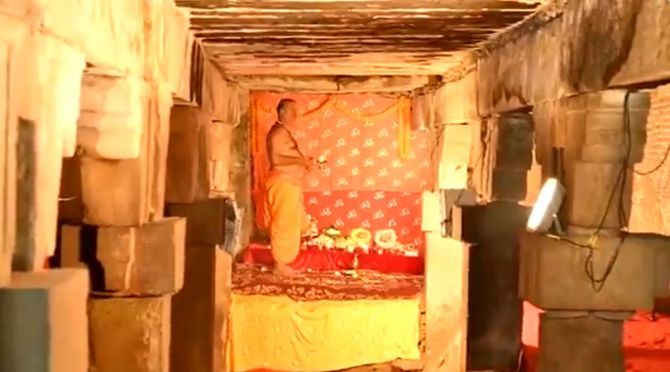Varanasi (Agency): Following a Varanasi Court’s decision to permit Hindu devotees to worship inside the Gyanvapi mosque complex, the basement area known as Vyas Ka Tehkhana saw the removal of barricades. On Thursday morning, daily arti and puja (worship rituals) were conducted.
According to Vishnu Shankar Jain, the lawyer representing the Hindu side, Mangla Arti was performed at 3:30 in the morning, followed by bhog (offering) at 12 pm.
Jain stated, “Timings for Aarti at Vyas cellar. Daily 5 aarti –Mangla- 3:30 am, Bhog- 12 pm, Apranh- 4 pm, Sanykaal- 7 pm, Shayan- 10:30 pm. 2 done so far.”
The court had instructed the district administration to make necessary arrangements within the next seven days. Jitendra Nath Vyas, a member of the Vyas family granted permission to offer prayers inside the mosque located next to the Kashi Vishwanath Temple in Varanasi, expressed his happiness about being able to pray at the Tehkhana again. “We are very happy that we have got the permission to resume puja there,” he said.
This development occurred after a Varanasi court allowed Hindu devotees to offer prayers inside the ‘Vyas Ka Tekhana’ area within the Gyanvapi mosque complex. During the puja, five priests from the Kashi Vishwanath temple trust, members of the Vyas family, the Varanasi District Magistrate, and Commissioner were present.
However, this decision has led to legal challenges, with the Muslim side, represented by the Anjum Intejamia committee, approaching the Allahabad High Court to challenge the Varanasi Court’s ruling. The Hindu side has also filed a caveat before the High Court, requesting to be heard before the plea is considered.
Akhlaq Ahmed, the lawyer for the Muslim side, argued, “The order has overlooked the Advocate Commissioner’s report from 2022, the Archaeological Survey of India’s report, and the 1937 decision, which was in our favor. The Hindu side has not provided any evidence that prayers were held before 1993. There is no such idol in the place.”
The Gyanvapi mosque complex contains four ‘tahkhanas’ (cellars) in the basement, one of which remains in the possession of the Vyas family, who used to reside there. Vyas, as a hereditary pujari (priest), had petitioned to be allowed entry to the tahkhana to resume pooja (religious rituals).
